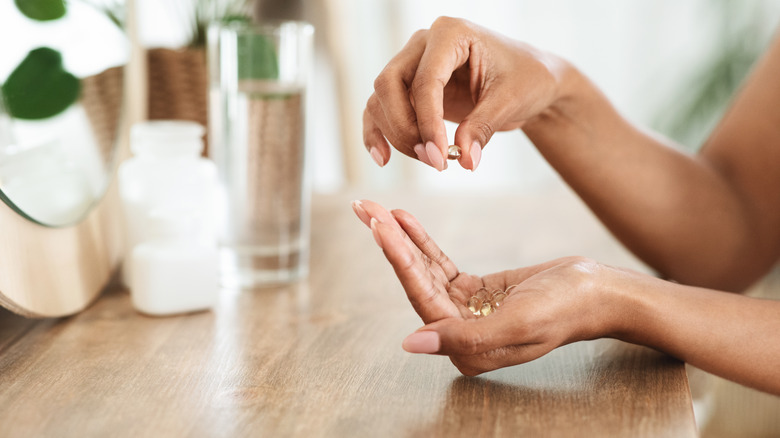The Best Supplements To Help Treat PMS Symptoms
Most women are no stranger to premenstrual syndrome, or PMS. This monthly condition can range from mildly irritating to severely impairing. While there are several helpful medications to treat PMS, some women are turning to vitamins and supplements as a more natural way to treat symptoms.
PMS can affect a woman's physical and mental health during certain days of the menstrual cycle, usually just before her menses (via Healthline). Symptoms can begin five to 11 days before menstruation, and while the cause of PMS is unknown, many doctors believe it's related to a change in hormone levels. According to a report in Cochrane Library, physical symptoms can include "breast tenderness, headaches, musculoskeletal pain, abdominal swelling, swelling of extremities, and weight gain." Psychological and behavioral symptoms can include "depression, changes in appetite, fatigue or lethargy, mood swings, irritability, sleep disturbances, tension, social withdrawal, and poor concentration" PMS is incredibly common, too — up to 90% of women will experience it.
Although over-the-counter pain medication, hormonal birth control, and even antidepressants can all be useful in treating PMS symptoms, according to the Office on Women's Health, some supplements have been shown to help, too.
Some vitamins and minerals can ease PMS symptoms
A 2018 report in Cochrane Library revealed that PMS can be related to deficiencies in particular vitamins and minerals, and supplementing with over-the-counter treatments may help.
Magnesium: According to a small study by the Society of Biological Psychiatry, some patients with PMS reflected lower concentrations of magnesium just before menses. As the "fourth most abundant mineral in the human body," magnesium is important for regulating the nervous system, according to Healthline.
Calcium and vitamin D: A study by the American Medical Association showed that women with a low intake of both calcium and vitamin D were more likely to suffer from PMS. Therefore, a higher intake of these supplements may help alleviate the severity of symptoms.
Zinc: The ratio of copper and zinc in your body may also affect the severity of PMS. According to a study in Fertility and Sterility, copper levels were high and zinc levels were low in patients with PMS. Because copper competes with zinc for intestinal absorption, a zinc deficiency may contribute to PMS symptoms.
While more extensive studies are needed to confirm the efficacy of using supplements to treat PMS, the current studies are promising. Always check with your health care provider before making changes to your regimen.


